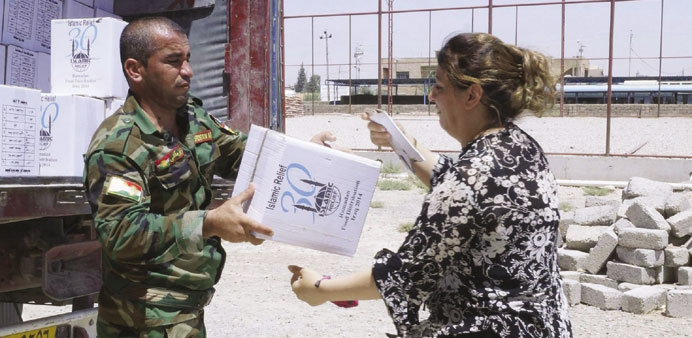A displaced Christian woman receives humanitarian supplies at a church in Hamdaniya town, east of Mosul.
Iraqi government air strikes killed 19 people, including children, in Fallujah on Monday and yesterday, a health official in the militant-held city said.
The Iraqi army has been shelling Fallujah, 70km west of Baghdad, for months, trying to drive out Sunni militants from the group now known as Islamic State. The insurgents, backed by discontented local Sunni tribal leaders, overran the city in January.
Ahmed al-Shami, spokesman for the Fallujah health office - the local arm of the health ministry - said the 19 dead included women and children and that Fallujah hospital had also received 38 wounded people since Monday evening.
Residents of Fallujah and the nearby town of Garma said helicopters fired artillery and dropped three barrel bombs on Fallujah and two on Garma.
Barrel bombs - powerful makeshift weapons made from high explosives, cement and metal parts packed into oil drums, usually dropped from helicopters - have gained notoriety in the region because of their use in neighbouring Syria by President Bashar al-Assad’s forces to flatten buildings in rebel-held areas.
Scores of people have died since January in what residents describe as massive indiscriminate bombardment. In May, witnesses in Fallujah and a mid-level security officer in Anbar province said barrel bombs had been dropped on the city.
The government denies indiscriminate attacks, saying it targets insurgents, but a mid-level security officer in Anbar province has previously confirmed that barrel bombs have been dropped on Fallujah.
Prime Minister Nuri al-Maliki’s military spokesman, Lieutenant General Qassim Atta, was not immediately available to comment on this week’s attacks.
Some 560,000 people have fled Anbar province - the large area of western Iraq where Fallujah is located - since the Islamic State takeover in January, according to New York-based humanitarian organisation, the International Rescue Committee.
Islamic State took a further vast swathe of northern territory last month that caused large numbers of government soldiers to desert their units and run for their lives.
Maliki’s office said yesterday he had met Sunni tribal leaders from several provinces where the conflict is raging. Anger with Maliki’s government has encouraged some Sunni armed groups to stick with the hardline Islamic State despite ideological differences, officials and tribal leaders say.
In the town of Abu al-Khaseeb, south of the predominantly Shia city of Basra, gunmen broke into a Sunni mosque yesterday during prayers, killing the preacher and kidnapping four men who were praying, police sources said.
The body of one of the kidnapped men was found dumped on the side of a road near the mosque, the sources said.
UN council denounces targeting of Christians
The UN Security Council has denounced militant persecution of Christians and other minorities in Iraq, warning such actions can be considered crimes against humanity.
The Islamic State, which last month declared a “caliphate” straddling large swathes of northern Iraq and Syria, has threatened a Christian presence in the region spanning close to two millennia.
Over the weekend, hundreds of families fled Mosul, a once-cosmopolitan city that is the country’s second largest.
In a unanimous declaration adopted late Monday, the Council’s 15 member countries condemned “in the strongest terms the systematic persecution of individuals from minority populations and those who refuse its extremist ideology in Iraq by ISIL and associated armed groups”, referring to the group’s former name of Islamic State of Iraq and the Levant.
“The members of the Security Council further recall that widespread or systematic attacks directed against any civilian populations because of their ethnic background, religious beliefs or faith may constitute a crime against humanity, for which those responsible must be held accountable.”
The Council also asked that the Iraqi government and the United Nations intensify their efforts to serve the “urgent” humanitarian needs of people displaced by the conflict and to tackle the “terrorist threat” against minorities.
On Sunday, the militants took over the fourth century Mar (Saint) Behnam monastery in northern Iraq, one of the country’s best-known Christian landmarks, and expelled its resident monks.
Christians abandoned their homes and belongings in Mosul after IS fighters running the city issued an ultimatum for Christians to convert, pay a special tax, leave or face the sword.
Before the 2003 US invasion, more than a million Christians lived in Iraq, including more than 600,000 in Baghdad and 60,000 in Mosul, as well as a substantial number in the oil city of Kirkuk and in Basra.
Until their forced exodus over the weekend, Christians had been continuously present in Mosul for about 16 centuries.

